Seagate 7200.10 500GB: Hitting the Sweet Spot
by Gary Key and Dave Robinet on July 6, 2007 11:00 PM EST- Posted in
- Storage
iPEAK Business Application Tests
Our iPEAK Winstone benchmarks offer a glimpse into how well our hard disk drives will handle general office applications, media encoding, and graphics manipulation. While the business applications that are being tested tend to be more CPU bound, the performance of the hard drive can and will make a difference in the more disk intensive video and graphics applications where large media files are typically being edited.
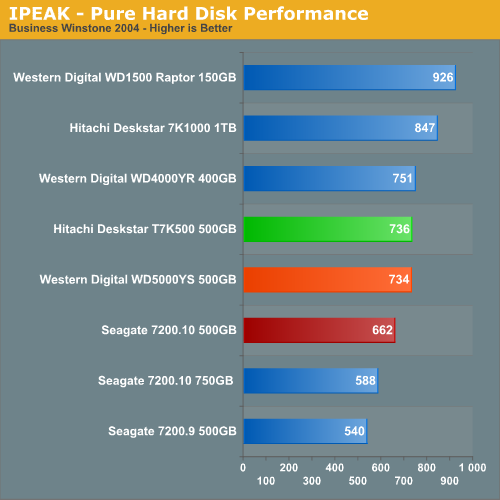
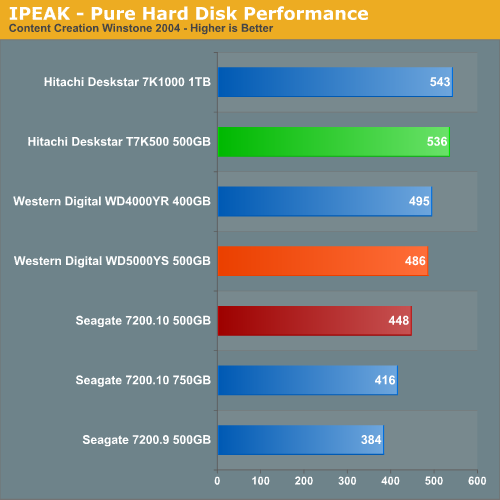
As expected the WD Raptor drives finish at the top in our business application tests as their 10k rpm spindle speed and optimized cache play an important role in their ability to sustain high transfer rates, especially in the Content Creation benchmark where transfer block sizes are significantly larger and more random than in the Business application benchmark.
We see our 7200.10 500GB performing a little better than the other two Seagate drives. We have noticed in these tests and others that the Seagate PMR drives do not handle small block sizes of data in non-sequential order as well as the other drives. In fact, the Seagate 500GB drive is about 20% slower in both of these tests than the Hitachi drive which mirrors our PCMark05 application results.
iPEAK General Task Tests
The iPEAK based General Task benchmarks are designed to replicate utility based application tasks that typically are disk intensive and represent common programs utilized on the majority of personal computers. While the WinRAR program is very CPU intensive it will typically stress the storage system in short bursts. Our antivirus benchmark will stress the storage system with continual reads and sporadic write requests while the defragmentation process is split between continual read and write requests.
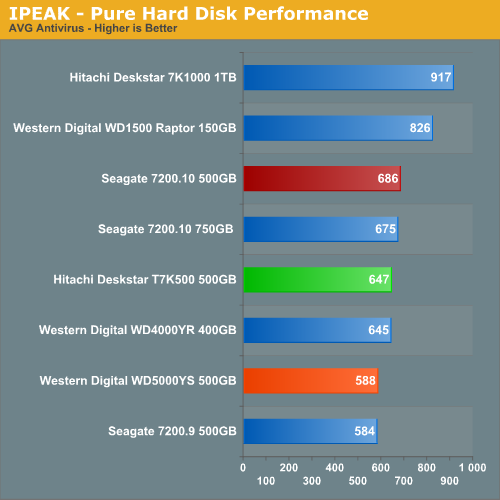
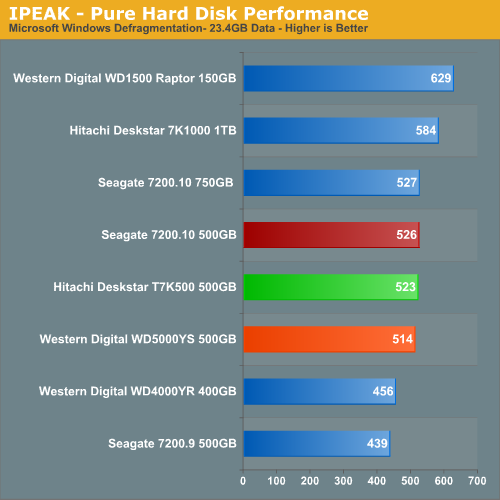
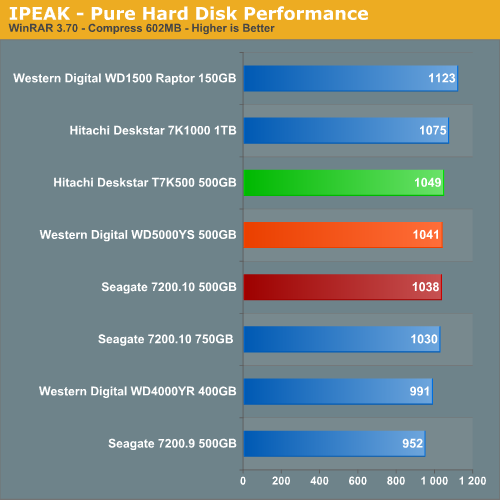
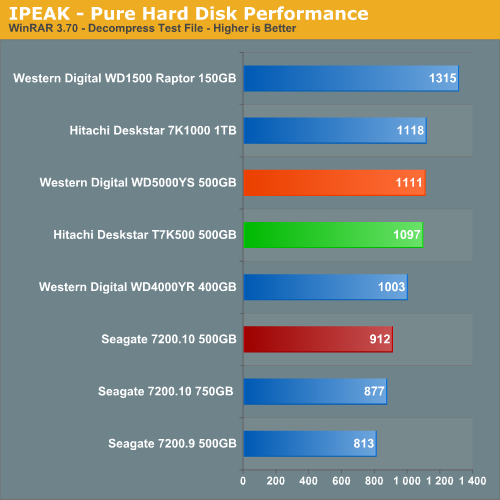
The 7200.10 500GB drive performs very well in the Antivirus and Defragmentation tests where its ability to handle sequential ordered blocks of data efficiently comes into play. In our WinRAR tests the Seagate drive leads the 500GB offering in the compression test but trails slightly in the decompression test as once again it is hampered by its inability to handle non-sequential data block sizes as well as other drives.
Our iPEAK Winstone benchmarks offer a glimpse into how well our hard disk drives will handle general office applications, media encoding, and graphics manipulation. While the business applications that are being tested tend to be more CPU bound, the performance of the hard drive can and will make a difference in the more disk intensive video and graphics applications where large media files are typically being edited.


As expected the WD Raptor drives finish at the top in our business application tests as their 10k rpm spindle speed and optimized cache play an important role in their ability to sustain high transfer rates, especially in the Content Creation benchmark where transfer block sizes are significantly larger and more random than in the Business application benchmark.
We see our 7200.10 500GB performing a little better than the other two Seagate drives. We have noticed in these tests and others that the Seagate PMR drives do not handle small block sizes of data in non-sequential order as well as the other drives. In fact, the Seagate 500GB drive is about 20% slower in both of these tests than the Hitachi drive which mirrors our PCMark05 application results.
iPEAK General Task Tests
The iPEAK based General Task benchmarks are designed to replicate utility based application tasks that typically are disk intensive and represent common programs utilized on the majority of personal computers. While the WinRAR program is very CPU intensive it will typically stress the storage system in short bursts. Our antivirus benchmark will stress the storage system with continual reads and sporadic write requests while the defragmentation process is split between continual read and write requests.




The 7200.10 500GB drive performs very well in the Antivirus and Defragmentation tests where its ability to handle sequential ordered blocks of data efficiently comes into play. In our WinRAR tests the Seagate drive leads the 500GB offering in the compression test but trails slightly in the decompression test as once again it is hampered by its inability to handle non-sequential data block sizes as well as other drives.










19 Comments
View All Comments
VooDooAddict - Sunday, July 8, 2007 - link
Transfer performance differences of most drives seems negligible for single drive end users. Actual formated size, heat, warranty, noise, and the ever important price are the keys for end users.That isn't to say your performance numbers are useful. I'd almost bet that engineers from SAN manufactures like EqualLogic check out these reviews. When you have those performance differences amplified by running 14+ spindles it's a little more noticeable.
Kaleid - Sunday, July 8, 2007 - link
with platter density at record high 334GB.PenGun - Sunday, July 8, 2007 - link
You know some of us need to know how fast a drive writes. Any reason that information is not available? All these stupid unzip the file are just braindead.lopri - Saturday, July 7, 2007 - link
What is the theoretical advantage of 'perpendicular' design? Out of curiosity.TA152H - Sunday, July 8, 2007 - link
Better density.psychobriggsy - Saturday, July 7, 2007 - link
5 year warranty.'nuff said.
Although a 3 year warranty isn't so bad, but that last 10% of performance really doesn't excite me when it's regarding hard drives.
Yeah, yeah, I'm justifying my 320GB 7200.10 :p
JakeBlade - Saturday, July 7, 2007 - link
Sorry, that should be 1 out of 10. (Drank too much wine with my steak tonight).LoneWolf15 - Sunday, July 8, 2007 - link
Got any stats to back that up? If so, I'd love to see them. 10% within 10 months seems like an awfully high failure rate to me (unless you're talking about long-defunct brands like JTS and Kalok).JakeBlade - Saturday, July 7, 2007 - link
5 year, 10 year, 15 year warranty. When the drive is made dirt cheap from the disenfranchised workforce in China, any hard drive company can easily slap a warranty on anything that needs 1 out of every 25 replaced within 10 months, while still making a huge profit from cheap manufacturing costs. My source: Newegg -- 266 reviews, first ~25 from lowest rating report DOA/Failure.Golgatha - Monday, July 9, 2007 - link
sarcasmYes, I can't imagine that those who received a DOA hard drive or one that failed within a short period of time being a little miffed and taking their frustration out on the Newegg.com ratings boards.
/sarcasm